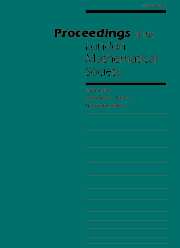Article contents
Finiteness properties of certain metabelian arithmetic groups in the function field case
Published online by Cambridge University Press: 01 September 1997
Abstract
Consider the group scheme
$$ R \mapsto G(R) := R \rtimes R^* = \left( \begin{array}{cc} 1 & R \\ 0 & R^* \end{array} \right) = \left( \begin{array}{cc} 1 & *\\ 0 & * \end{array} \right) \cap \mathrm{GL}_2(R) $$
where $R$ is an arbitrary commutative ring with $1 \neq 0$ and a unit $x \in R^*$ acts on $R$ by multiplication.
We will study the finiteness properties of subgroups of $G(\Oka_S)$ where $\Oka_S$ is an $S$-arithmetic subring of a global function field. The subgroups we are interested in are of the form $\Oka_S \rtimes Q$ where $Q$ is a subgroup of $\Oka_S^*$. The finiteness properties of these metabelian groups can be expressed in terms of the $\Sigma$-invariant due to R. Bieri and R. Strebel.
{\sc Theorem A.} {\it Let $S$ be a finite set of places of a global function field (regarded as normalized discrete valuations) and $\Oka_S$ the corresponding $S$-arithmetic ring. Let $Q$ be a subgroup of $\Oka_S^*$. Then $Q$ is finitely generated and for all integers $n \geq 1$ the following are equivalent:
\begin{enumerate} \item[\rm (1)] $\Oka_S \rtimes Q$ is of type FP$_n$;
\item[\rm (2)] $\Oka_S$ is $n$-tame as a $\ZZZ Q$-module;
\item[\rm (3)] each $p \in S$ restricts to a non-trivial homomorphism $p|_{Q} : Q \rightarrow \RRR$ and the set $\{ [p|_Q] \mid p \in S \} \subseteq \SSS(Q)$ is $n$-tame. \end{enumerate}
If these conditions hold for at least one $n \geq 1$ then the identity
$$ \Sigma_{\Oka_S}^c(Q,\ZZZ) = \{ [p|_Q] \mid p \in S \} $$
holds.} {\sc Theorem B.} {\it Let $r$ denote the rank of $Q$. Then the following hold: \begin{enumerate} \item[\rm (1)] the group $\Oka_S \rtimes Q$ is not of type FP$_{r+1}$;
\item[\rm (2)] if $Q$ has maximum rank $r=|S|-1$ then the group $\Oka_S \rtimes Q$ is of type FP$_r$.
\end{enumerate} In particular, $G(\Oka_S) = \Oka_S \rtimes \Oka_S^*$ is of type FP$_{|S|-1}$ but not of type FP$_{|S|}$.}
1991 Mathematics Subject Classification: 20E08, 20F16, 20G30, 52A20.
- Type
- Research Article
- Information
- Proceedings of the London Mathematical Society , Volume 75 , Issue 2 , September 1997 , pp. 308 - 322
- Copyright
- London Mathematical Society 1997
- 8
- Cited by




